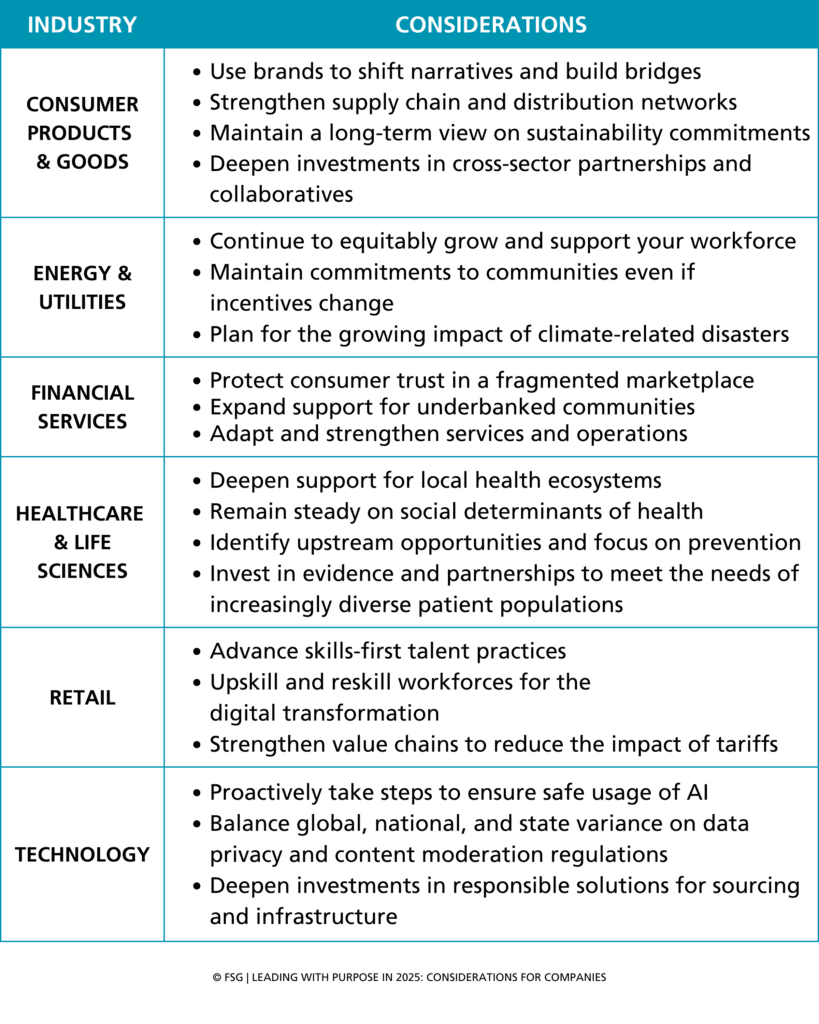Building Empathetic Agility: The Leadership Muscle for Navigating Complexity with Purpose
Empathetic agility is the ability to adapt strategically and maintain momentum, while genuinely considering the experiences of others.

Less than a month into the year, an ever-shifting terrain and operating context is causing companies and purpose-driven leaders to reflect on how they will lead in 2025. The new U.S. presidential administration has issued a series of executive orders, directives, and other actions that will no doubt impact corporate sustainability, workforce development, and community engagement strategies and programs. The Los Angeles wildfires are the latest climate disaster to highlight the economic, health, and environmental disparities that accompany the climate crisis. And the 2025 Edelman Trust Barometer showed that while trust in business remains high across the globe, multiple institutional failures across government, business, NGOs, and the media over the last 25 years have produced grievances around the world, stifling both growth and innovation. In short, business faces many opportunities and challenges in this moment and without a clear roadmap it may be difficult to know how to move forward.
We asked leaders across FSG’s U.S. corporate practice to share insights about how business and corporate changemakers can proactively prepare for the road ahead, align with stakeholders, and navigate and adapt to complexity in a polarized environment—all while staying true to their purpose, taking a long-term view on the company’s competitive advantage, and contributing to better societal outcomes for all.
Below are key considerations based on industry to help you navigate the potential opportunities and challenges on the horizon.

Many consumer products & goods (CPG) companies have embraced being purpose-driven through their product portfolios, while advancing sustainability and human rights commitments. In an era of increasing polarization, varying regulatory landscapes, and uncertainty about U.S. policy changes, here are four ways that CPG companies can strengthen their social impact and contribute to social cohesion while continuing to advance their purpose:
Energy and utility companies continue to lead towards a green transition—in the midst of technological advancements, automation, AI, increases in federal funding flows, and the regulatory environment. While sentiment and language related to sustainability and equity continue to waver, we still expect that the clean energy transition will endure and remain a business and social imperative. Here are three considerations for the industry to sustain and enhance their social impact:
Financial services companies will navigate a shifting landscape influenced by trends such as cooling inflation, increased fintech and AI adoption, cryptocurrency growth, and anticipated deregulation. Institutions committed to social impact can focus on three areas to foster financial resilience for their consumers, communities, and operations:
The new federal administration will likely shape policy priorities that influence access, pricing, and technological advancements in healthcare. Critical issues such as funding for public health agencies and programs, health and regulatory policy, and innovation will drive decisions for healthcare and life sciences companies. Here are three considerations for these companies to continue advancing health equity:
The rapid acceleration of technology and AI as well as the impacts of trade, immigration, and environmental regulations will shape the retail industry over the next several years. Here are three ways that purpose-led retail companies can act with resilience, innovation, and adaptability while continuing to protect employee well-being and advance talent amidst these changes:
As the new administration sets its agenda for tech-related policies and priorities, companies must prepare for potential changes in areas such as cybersecurity, AI, supply chains, and more. With the AI revolution in full swing and shifts in regulation, workforce dynamics, and sustainability efforts, here are three key considerations for the technology industry to navigate in 2025 and beyond:
As corporate social impact leaders prepare for changes ahead, it’s essential to ground your company’s strategies in purpose and values while taking a long-term view. This can help companies identify how to continue driving meaningful societal impact while navigating potential changes under the new U.S. administration and building business competitiveness for years to come. Staying committed to and engaged with communities and stakeholders is also crucial and, where possible, pursuing collective action. There is strength in numbers, which will be critical to navigating industry changes, understanding local dynamics, responsibly elevating community voice, and strengthening the broader enabling environment to sustain long-term change for the issues your company is looking to impact. Finally, it’s important to remember that companies do have a voice and significant societal and political influence. Companies can use their voice alongside other assets in their purpose portfolio (e.g., philanthropy, products and services, supply chain, and distribution networks) to broaden their impact and catalyze others. By preparing and responding now, companies can not only navigate the potential changes of the new U.S. administration but also lead boldly in shaping a more equitable and sustainable future for all.
Note: FSG is a nonpartisan 501(c)3 nonprofit organization that does not endorse candidates for office or engage in any partisan political activities. The insights and recommendations provided are intended for informational purposes only and do not constitute legal, financial, or political advice.
Empathetic agility is the ability to adapt strategically and maintain momentum, while genuinely considering the experiences of others.
What does 2026 mean for the future of social impact?
Achieving impact through AI will require purpose, intentional deployment, and responsible risk management.
You will also receive email updates on new ideas and resources from FSG.
"*" indicates required fields
You will also receive email updates on new ideas and resources from FSG.
"*" indicates required fields
Get updates on new ideas and resources from FSG.
"*" indicates required fields
| Cookie | Duration | Description |
|---|---|---|
| cookielawinfo-checkbox-analytics | 11 months | This cookie is set by GDPR Cookie Consent plugin. The cookie is used to store the user consent for the cookies in the category "Analytics". |
| cookielawinfo-checkbox-functional | 11 months | The cookie is set by GDPR cookie consent to record the user consent for the cookies in the category "Functional". |
| cookielawinfo-checkbox-necessary | 11 months | This cookie is set by GDPR Cookie Consent plugin. The cookies is used to store the user consent for the cookies in the category "Necessary". |
| cookielawinfo-checkbox-others | 11 months | This cookie is set by GDPR Cookie Consent plugin. The cookie is used to store the user consent for the cookies in the category "Other. |
| cookielawinfo-checkbox-performance | 11 months | This cookie is set by GDPR Cookie Consent plugin. The cookie is used to store the user consent for the cookies in the category "Performance". |
| viewed_cookie_policy | 11 months | The cookie is set by the GDPR Cookie Consent plugin and is used to store whether or not user has consented to the use of cookies. It does not store any personal data. |
